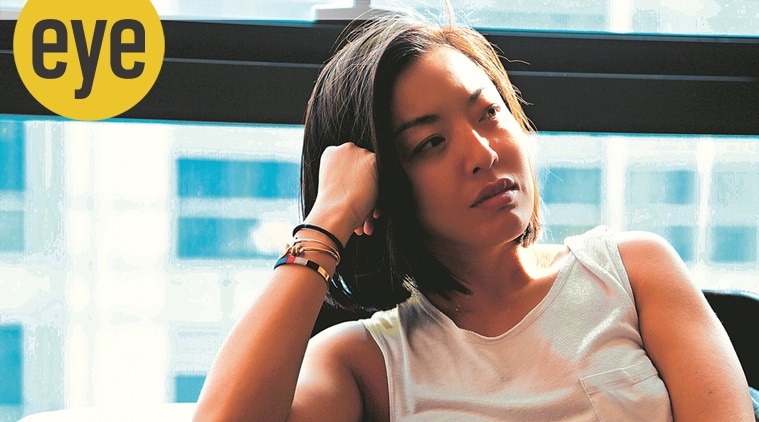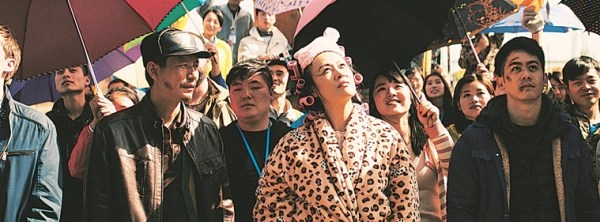 Cathy Yan.
Cathy Yan. Three years ago, Chinese-American Cathy Yan, 35, had emerged as a young writer-director to watch out for following the premiere of her independent debut feature Dead Pigs at Sundance Film Festival, the US. The dark satirical feature set in contemporary China won a special jury award for ensemble acting but had to wait to reach the global audience. In the meantime, her second film, the Margot Robbie-starrer Hollywood superhero movie Birds of Prey (2020), backed by Warner Bros and DC Films, was released last year. After a long wait, the online streaming platform MUBI released and began streaming her debut Dead Pigs last month. The journalist-turned-filmmaker talks about her “deeply personal” debut, directing a big-budget studio movie, and her flawed protagonists.
 A still from Dead Pigs
A still from Dead Pigs
Excerpts:
Your sophomore feature Bird of Prey’s release preceded your debut Dead Pigs.
It’s a strange trajectory. Birds of Prey is a much bigger movie — it’s a studio film and wasn’t written by me. Dead Pigs, while it’s not autobiographical, is inspired by my life as someone who spent time both in America and China, trying to make sense of her birth country. As a writer-director, I’m looking forward to showing the world what my instincts are and what I can do when I’m both writing and directing a subject matter that’s deeply personal. I, obviously, have a weird affinity for animals in my titles as well (laughs).
You have lived in China, Hong Kong and the US. Why did you choose China as the setting for your debut?
I left China when I was four years old. As a non-white person, growing up in suburban America, I always felt like an outsider. I felt I wanted to understand my birth country better. I spent a lot of time in China, from 2006 until I made Dead Pigs. It was such a fascinating place to be then and still is. It was getting ready for the Beijing Olympics (in 2008), the economy was booming, and it seemed a new industrial revolution was taking place. When I started writing Dead Pigs, I was inspired by true events like 16,000 dead pigs found in the (Huangpu) river (in 2013). I found it to be oddly cinematic and very symbolic of the repercussions of capitalism and fast growth. At that time of my life, I was trying to understand myself through the lens of China.
Did the absurdity of the incident lend itself to the quirkiness in your writing?
I instinctively gave the title Dead Pigs to my first draft and it was never changed even though some found it harsh. I was trying to go for that weird, darkly-humorous tone. It’s bizarre and kitschy. Modern China is full of that. There are also other events I touch upon in the film that are inspired by real life.
Did you feel that handling so many characters were going to be a task?
It was definitely a risk. There’s something very safe and familiar about picking a protagonist and making a love story. I’ve been inspired by the work filmmakers Robert Altman and Paul Thomas Anderson have done with multiple protagonists. I felt it appropriate for me to try and tell the story through a collection of perspectives/stories, as opposed to just one.
How did you transition from editing Dead Pigs in your living room to the $100-million project, Birds of Prey?
I went from doing something with my friends to a very different type of production, which was not that different because, as a director, you have to rely on the same group of people you’d normally rely on. During post-production, it hit me that Birds of Prey was a very different movie. During its release, I realised the film will impact the dolls which are being made and sold. My learning had less to do with filmmaking and more with how Hollywood works. We made the indie with no money and no one guiding us what to do. If we can make that, we can make a studio film, too.
What do you have to say about the winds of change where women are helming big-budget action and superhero films?
I hope this change is real and it sticks around. It’s not enough to just hire some women but supporting them through the process. We’re getting there but women aren’t asked to do that many action films which are not female-focused. The next step is to open that up and say: ‘We’re not looking for a female director. We’re looking for the best director.’
As a woman director of Asian origin, do you feel it your duty to tell certain kinds of stories to a larger audience?
Absolutely. Because of the way, I was raised, and what my interests are, I’m naturally going to gravitate towards those subject matters. I’m devoted to making the female characters feel real, not perfect. There’s a lot of work to be done in representing women as they really are, not aggrandize them, make them feel so unfamiliar because they’re too perfect or masculine in some ways. Whether it’s Candy in Dead Pigs or all the women in Birds of Prey, I don’t think women have to be likeable. They have to be real. And female directors should be able to direct whatever they put their minds to.
What kind of stories do you want to tell?
Less genre-specific, more about the perspective. All my stories are grounded, character-focused and are often about complicated flawed protagonists who are either women or people of colour or both.
 Continue with Facebook
Continue with Facebook Continue with Google
Continue with Google